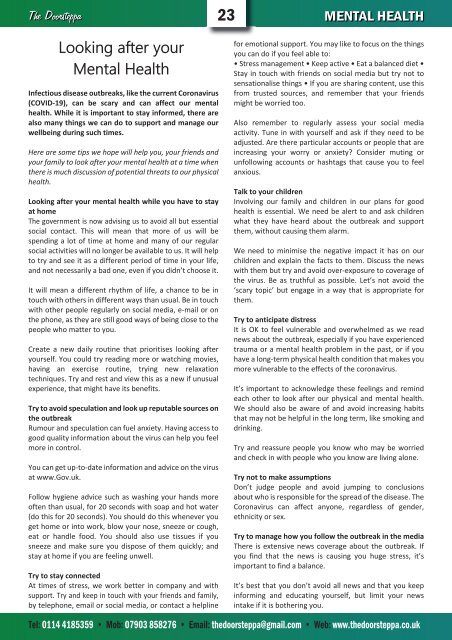Eckington & Killamarsh Doorsteppa April 20
You also want an ePaper? Increase the reach of your titles
YUMPU automatically turns print PDFs into web optimized ePapers that Google loves.
The <strong>Doorsteppa</strong><br />
23 MENTAL HEALTH<br />
Infectious disease outbreaks, like the current Coronavirus<br />
(COVID-19), can be scary and can affect our mental<br />
health. While it is important to stay informed, there are<br />
also many things we can do to support and manage our<br />
wellbeing during such times.<br />
Here are some tips we hope will help you, your friends and<br />
your family to look after your mental health at a time when<br />
there is much discussion of potential threats to our physical<br />
health.<br />
Looking after your mental health while you have to stay<br />
at home<br />
The government is now advising us to avoid all but essential<br />
social contact. This will mean that more of us will be<br />
spending a lot of time at home and many of our regular<br />
social activities will no longer be available to us. It will help<br />
to try and see it as a different period of time in your life,<br />
and not necessarily a bad one, even if you didn’t choose it.<br />
It will mean a different rhythm of life, a chance to be in<br />
touch with others in different ways than usual. Be in touch<br />
with other people regularly on social media, e-mail or on<br />
the phone, as they are still good ways of being close to the<br />
people who matter to you.<br />
Create a new daily routine that prioritises looking after<br />
yourself. You could try reading more or watching movies,<br />
having an exercise routine, trying new relaxation<br />
techniques. Try and rest and view this as a new if unusual<br />
experience, that might have its benefits.<br />
Try to avoid speculation and look up reputable sources on<br />
the outbreak<br />
Rumour and speculation can fuel anxiety. Having access to<br />
good quality information about the virus can help you feel<br />
more in control.<br />
You can get up-to-date information and advice on the virus<br />
at www.Gov.uk.<br />
Follow hygiene advice such as washing your hands more<br />
often than usual, for <strong>20</strong> seconds with soap and hot water<br />
(do this for <strong>20</strong> seconds). You should do this whenever you<br />
get home or into work, blow your nose, sneeze or cough,<br />
eat or handle food. You should also use tissues if you<br />
sneeze and make sure you dispose of them quickly; and<br />
stay at home if you are feeling unwell.<br />
Try to stay connected<br />
At times of stress, we work better in company and with<br />
support. Try and keep in touch with your friends and family,<br />
by telephone, email or social media, or contact a helpline<br />
for emotional support. You may like to focus on the things<br />
you can do if you feel able to:<br />
• Stress management • Keep active • Eat a balanced diet •<br />
Stay in touch with friends on social media but try not to<br />
sensationalise things • If you are sharing content, use this<br />
from trusted sources, and remember that your friends<br />
might be worried too.<br />
Also remember to regularly assess your social media<br />
activity. Tune in with yourself and ask if they need to be<br />
adjusted. Are there particular accounts or people that are<br />
increasing your worry or anxiety? Consider muting or<br />
unfollowing accounts or hashtags that cause you to feel<br />
anxious.<br />
Talk to your children<br />
Involving our family and children in our plans for good<br />
health is essential. We need be alert to and ask children<br />
what they have heard about the outbreak and support<br />
them, without causing them alarm.<br />
We need to minimise the negative impact it has on our<br />
children and explain the facts to them. Discuss the news<br />
with them but try and avoid over-exposure to coverage of<br />
the virus. Be as truthful as possible. Let’s not avoid the<br />
‘scary topic’ but engage in a way that is appropriate for<br />
them.<br />
Try to anticipate distress<br />
It is OK to feel vulnerable and overwhelmed as we read<br />
news about the outbreak, especially if you have experienced<br />
trauma or a mental health problem in the past, or if you<br />
have a long-term physical health condition that makes you<br />
more vulnerable to the effects of the coronavirus.<br />
It’s important to acknowledge these feelings and remind<br />
each other to look after our physical and mental health.<br />
We should also be aware of and avoid increasing habits<br />
that may not be helpful in the long term, like smoking and<br />
drinking.<br />
Try and reassure people you know who may be worried<br />
and check in with people who you know are living alone.<br />
Try not to make assumptions<br />
Don’t judge people and avoid jumping to conclusions<br />
about who is responsible for the spread of the disease. The<br />
Coronavirus can affect anyone, regardless of gender,<br />
ethnicity or sex.<br />
Try to manage how you follow the outbreak in the media<br />
There is extensive news coverage about the outbreak. If<br />
you find that the news is causing you huge stress, it’s<br />
important to find a balance.<br />
It’s best that you don’t avoid all news and that you keep<br />
informing and educating yourself, but limit your news<br />
intake if it is bothering you.<br />
Tel: 0114 4185359 • Mob: 07903 858276 • Email: thedoorsteppa@gmail.com • Web: www.thedoorsteppa.co.uk

















